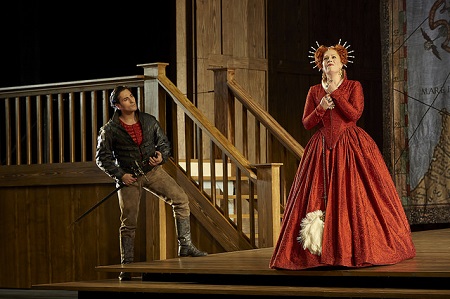
The Canadian Opera Company brings Queen Elizabeth I’s later years to life in Roberto Devereux at Toronto’s Four Seasons
Roberto Devereux by Gaetano Donizetti tells the story of the tragic end to the celebrated rein of Elizabeth the First. The set for the Canadian Opera Company’s 2014 production is a reconstruction of the historic Globe Theatre. During the overture, surtitles were used to provide the audience with historical context and the audience was treated to a charming tableau wherein Shakespeare directs the Queen herself in a production of A Midsummer Night’s Dream.
Robert Devereux was reputed to be the Queen’s love interest later on in life. He became a favourite at court after the death of his stepfather, Robert Dudley, the Earl of Leicester and the purported love of the Queen’s life. At the beginning of this opera Devereux, the Earl of Essex has been accused of treason. The Queen has agreed to stay his execution – if he will only profess his love for her.
I loved the use of costumes in this production, and not just because Elizabethan attire is striking and beautiful. The interplay of strength and vulnerability in the Queen’s character was cleverly communicated by wardrobe. At times she appeared in regal, colourful and commanding period attire, complete with elaborate powdered wigs and powder. At times when the character was at her most vulnerable and despairing she was laid almost bear in a sheer nightgown and disheveled, sparse hair that had clearly fallen prey to the ravages of age.
Donizetti is one of the key figures in early 19th Century Italian opera. The music in operas from this era is generally light, pleasing to the ear and features long, florid, melodic lines. At times orchestration falls away completely and singers are given an opportunity to showcase their virtuosity with intricate, unaccompanied passages known as cadenzas. Cadenzas can be highly improvisatory and rhythmically free. This can create some ensemble challenges when the orchestra comes back in. While the opening night performance had not resolved all of these challenges, the audience did get to experience some truly remarkable singing.
Tenor Leonardo Capalbo in the title role looked and sounded the part of the daring romantic hero. His voice has a captivating mix of youthful vitality and rich colour. Soprano Sondra Radvanovsky as Queen Elizabeth has a laudable evenness of tone and extraordinary control throughout her impressive range. The timber of her voice is malleable enough to capture the highs and lows of the character. Mezzo-Soprano Allyson McHardy’s voice has a dark resonance that was just right for he part of the tragic heroine. She is also blessed with an instrument that is both weighty and agile, a perfect combination for a dramatic role in this style of opera. It is always a pleasure to hear baritone Russell Braun perform. I have never seen him play a villain before and was deeply impressed by his ability to infuse his naturally sweet voice with a menacing edge. My companion was particularly engaged by the virtuosity demonstrated by Ms. McHardy and Ms. Radvanovsky.
Popular culture is understandably fascinated by the tale of the imposing, fearlessly single queen who led her country through a Golden Age. The story is based on actual events and provided some interesting insights into this important historical figure. Despite my academic interest, I did not find myself getting as emotionally involved in the characters as I thought I might. I did thoroughly enjoy the music, the period set and costumes and the insight into how Elizabeth the First was seen in the early 19th Century.
Details:
- Roberto Devereux is playing until May 21 at Four Seasons Centre for the Performing Arts (145 Queen Street West)
- Show times are 7:30 PM on April 29 and May 3, 15, and 21 with additional matinees on May 10 at 4:30 PM and May 18 at 2 PM
- Ticket prices range from $45 – $365. Patrons under 30 can purchase tickets for $22 or $35 here.
- Tickets are available online, or through the box office at 416-363-8231 (long distance 1-800-250-4653)
Photo of Sondra Radvanovsky and Leonardo Capalbo by Michael Cooper
